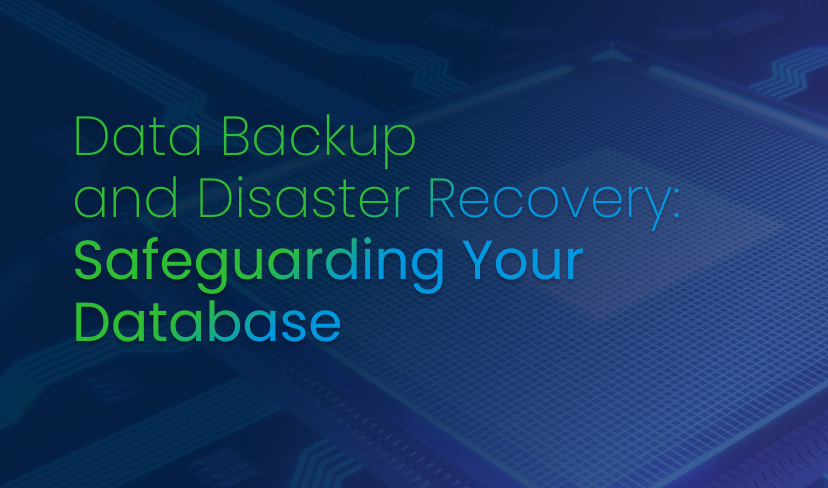In this digital age, databases store critical information, including customer data, financial records, and proprietary business data. Any loss or compromise of this data can have severe consequences for an organisation. Therefore, implementing robust data backup and disaster recovery strategies is essential to safeguard your database and ensure business continuity.
Understanding Data Backup
Data backup refers to the process of creating copies of your data and storing them in a separate location. Regular backups are essential as they provide a fallback option in case of data loss due to hardware failure, human error, or malicious attacks. By maintaining up-to-date backups, you can restore your database to a previous state and minimise the impact of data loss.
The Significance of Disaster Recovery
Disaster recovery focuses on the steps and procedures involved in restoring operations after a catastrophic event. Whether it’s a natural disaster, a cyber-attack, or a hardware failure, having a well-defined disaster recovery plan ensures that your business can recover swiftly and efficiently. This includes not only restoring data but also ensuring the availability of critical systems and applications.
Ensuring Database Security
This is crucial to protect your sensitive information from unauthorised access, data breaches, and cyber-attacks. Implementing robust security measures, such as access controls, encryption, and regular security audits, helps safeguard your database from potential threats. It’s essential to stay proactive and up-to-date with the latest security practices to mitigate risks effectively.
Best Practices for Data Backup
To ensure the effectiveness of your data backup and disaster recovery strategies, consider the following best practices:
- Regularly schedule automated backups to minimise the risk of data loss.
- Store backups in multiple locations, including off-site and cloud-based solutions.
- Test backups regularly to ensure their integrity and reliability.
- Document and update your disaster recovery plan, including roles and responsibilities.
- Conduct regular security audits to identify vulnerabilities and address them promptly.
- Train employees on data backup procedures and disaster response protocols.
The Role of Managed IT Services
Managed IT services can significantly enhance your data backup and disaster recovery capabilities. By partnering with a trusted managed service provider, you gain access to expert resources, advanced technologies, and proactive monitoring. This ensures that your data remains secure, and your systems are continuously monitored and updated for optimal performance.
Implementing a Comprehensive Backup Plan
A comprehensive backup plan involves a multi-tiered approach to ensure redundancy and availability. It includes both on-site and off-site backups, leveraging technologies such as tape drives, external hard drives, and cloud storage. By diversifying your backup locations and methods, you can mitigate the risk of data loss and increase your chances of successful recovery.
Disaster Recovery Testing: Ensuring Readiness
Regular disaster recovery testing is vital to verify the effectiveness of your recovery plan. Testing helps identify any gaps, weaknesses, or bottlenecks in your procedures and allows you to fine-tune them accordingly. By simulating real-world scenarios and evaluating the recovery process, you can ensure readiness and minimise downtime in the event of an actual disaster.
Protecting Against Data Loss
Data loss can occur due to various reasons, including hardware failure, human error, software bugs, or cyber-attacks. To protect against data loss, consider implementing:
- Redundant hardware configurations, such as RAID (Redundant Array of Independent Disks) systems.
- Continuous data protection solutions that capture real-time changes and ensure minimal data loss.
- Versioning and snapshot capabilities to restore data to specific points in time.
Database Security Measures
Data security involves implementing a range of measures to protect your database from unauthorised access. Some essential security measures include:
- Role-based access controls to limit user privileges and ensure data confidentiality.
- Regular security patches and updates to address known vulnerabilities.
- Intrusion detection and prevention systems to monitor and prevent unauthorised access attempts.
- Encryption of sensitive data to protect it from being compromised in case of a breach.
The Benefits of Data Encryption
Data encryption is a critical component of database security. By encrypting your data, you render it unreadable to unauthorised individuals even if they manage to gain access to the database. Encryption ensures that your sensitive information remains protected, reducing the risk of data breaches and unauthorised data access.
Minimising Downtime: High Availability Solutions
High availability solutions aim to minimise downtime by ensuring continuous access to your database and applications. This involves implementing technologies such as redundant servers, load balancing, and failover mechanisms. By minimising the impact of hardware failures or system disruptions, high availability solutions help maintain uninterrupted business operations.
Choosing the Right Backup Solution
Selecting the appropriate backup solution is crucial to meet your specific business requirements. Factors to consider when choosing a backup solution include:
- Scalability to accommodate your growing data volume.
- Reliability and integrity of backups to ensure successful recovery.
- Compatibility with your existing infrastructure and database systems.
- Automation and ease of use for streamlined backup processes.
The Role of Cloud Backup
Cloud backup offers numerous advantages, including scalability, cost-effectiveness, and off-site data storage. By leveraging cloud-based backup solutions, you can eliminate the need for on-premises infrastructure and reduce the risk of data loss due to localised disasters. Cloud backup also provides added flexibility, allowing you to access your data from anywhere at any time.
Conclusion
Data backup and disaster recovery are crucial elements of protecting your valuable database. By implementing robust strategies and security measures, you can minimise the risk of data loss, ensure business continuity, and safeguard your organisation’s reputation. Remember to regularly review and update your backup and recovery plans to adapt to changing technology and evolving threats.
By partnering with Transputec, a leading expert in data backup and disaster recovery solutions, you can access the expertise and cutting-edge technologies needed to protect your data effectively. Contact us today to get started with Transputec and secure the future of your business.




